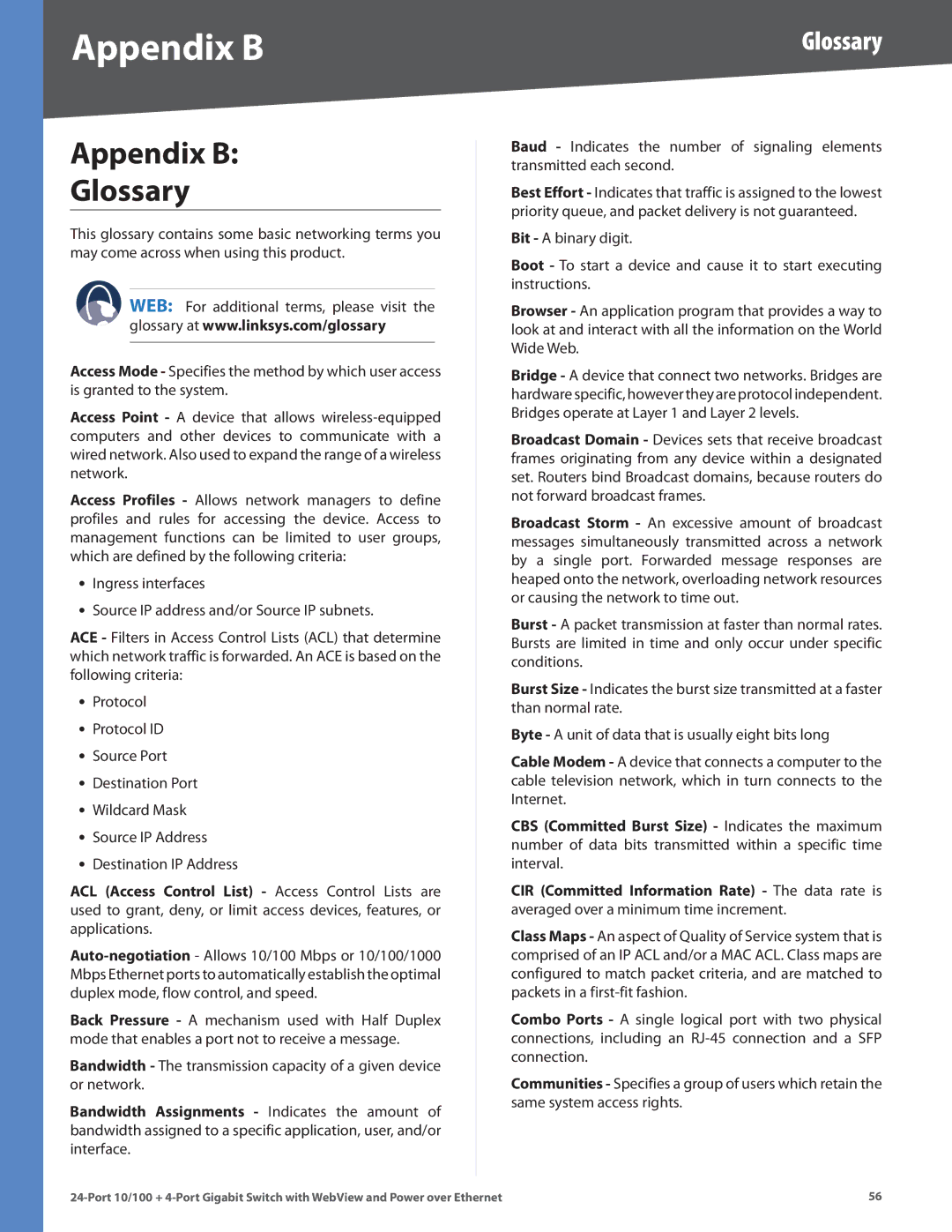
Appendix B
Appendix B:
Glossary
This glossary contains some basic networking terms you may come across when using this product..
![]() WEB: For additional terms, please visit the
WEB: For additional terms, please visit the
glossary at www.linksys.com/glossary
Access Mode - Specifies the method by which user access is granted to the system..
Access Point - A device that allows
Access Profiles - Allows network managers to define profiles and rules for accessing the device.. Access to management functions can be limited to user groups, which are defined by the following criteria:
•Ingress interfaces
•Source IP address and/or Source IP subnets..
ACE - Filters in Access Control Lists (ACL) that determine which network traffic is forwarded.. An ACE is based on the following criteria:
•Protocol
•Protocol ID
•Source Port
•Destination Port
•Wildcard Mask
•Source IP Address
•Destination IP Address
ACL (Access Control List) - Access Control Lists are used to grant, deny, or limit access devices, features, or applications..
Back Pressure - A mechanism used with Half Duplex mode that enables a port not to receive a message..
Bandwidth - The transmission capacity of a given device or network..
Bandwidth Assignments - Indicates the amount of bandwidth assigned to a specific application, user, and/or interface..
Glossary
Baud - Indicates the number of signaling elements transmitted each second..
Best Effort - Indicates that traffic is assigned to the lowest priority queue, and packet delivery is not guaranteed..
Bit - A binary digit..
Boot - To start a device and cause it to start executing instructions..
Browser - An application program that provides a way to look at and interact with all the information on the World Wide Web..
Bridge - A device that connect two networks.. Bridges are hardware specific, however they are protocol independent.. Bridges operate at Layer 1 and Layer 2 levels..
Broadcast Domain - Devices sets that receive broadcast frames originating from any device within a designated set.. Routers bind Broadcast domains, because routers do not forward broadcast frames..
Broadcast Storm - An excessive amount of broadcast messages simultaneously transmitted across a network by a single port.. Forwarded message responses are heaped onto the network, overloading network resources or causing the network to time out..
Burst - A packet transmission at faster than normal rates.. Bursts are limited in time and only occur under specific conditions..
Burst Size - Indicates the burst size transmitted at a faster than normal rate..
Byte - A unit of data that is usually eight bits long
Cable Modem - A device that connects a computer to the cable television network, which in turn connects to the Internet..
CBS (Committed Burst Size) - Indicates the maximum number of data bits transmitted within a specific time interval..
CIR (Committed Information Rate) - The data rate is averaged over a minimum time increment..
Class Maps - An aspect of Quality of Service system that is comprised of an IP ACL and/or a MAC ACL.. Class maps are configured to match packet criteria, and are matched to packets in a
Combo Ports - A single logical port with two physical connections, including an
Communities - Specifies a group of users which retain the same system access rights..
56 |
